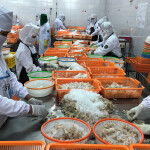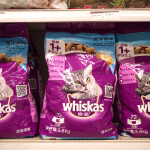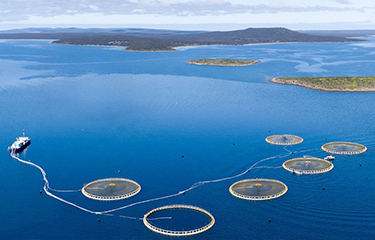Australian yellowtail kingfish farmer Clean Seas posted record revenue and higher profitability in the 2023 fiscal year, achieving positive cashflow.
The Royal Park, South Australia, Australia-based company posted a record revenue of AUD 69.4 million (USD 44.7 million, EUR 41.5 million) in FY 2023, up AUD 3.24 million (USD 2.01 million, EUR 1.94 million) from the AUD 66.1 million (USD 42.6 million, EUR 39.5 million) it posted in FY 2022.. Clean Seas also managed to significantly lower its production costs from AUD 46.5 million (USD 30 million, EUR 27.8 million) in FY 2022 to AUD 39.8 million (USD 25.6 million, EUR 23.8 million) in 2023, a drop of AUD 6.7 million (USD 4.3 million, EUR 4 million).
For the year, Clean Seas achieved a gross profit of AUD 14.6 million (USD 9.4 million, EUR 8.7 million), up from the AUD 6.8 million (USD 4.4 million, EUR 4 million) it earned in FY 2022. The company’s operating earnings before interest, taxes, depreciation, and amortization (EBITDA) also shifted into the positive, with the company earning AUD 3.7 million (USD 2.4 million, EUR 2.2 million) compared to the AUD 4.8 million (USD 3.1 million, EUR 2.8 million) in losses it posted in FY 2022.
“This result can be attributed to the effective implementation of the FY21 to FY23 turnaround strategy, which has transformed Clean Seas into a profitable business,” the company said in its earnings report.
The company posted an underlying operating EBITDA per kilogram of AUD 1.21 (USD 0.78, EUR 0.72), improved form the loss of AUD 1.28 (USD 0.82, EUR 0.76) per kilogram It posted in FY 2022.
Clean Seas reported it was able to achieve higher sales prices for its yellowtail, allowing it to record higher revenue despite selling 19 percent less product by volume. It achieved a per-kilogram average price of AUD 22.73 (USD 14.65, EUR 13.60), up from AUD 17.61 (USD 11.35, EUR 10.54) in the previous year, including achieve a per-kilogram average for its frozen product of AUD 22.18 (USD 14.30, EUR 13.27) in FY 2023, up from AUD 14.06 (USD 9.06, EUR 8.41) in FY 2022.
“Fresh and frozen price increases continue to be driven by the transition away from an overstocked live fish biomass and frozen inventory position,” the company said.
Clean Sea's Production costs rose slightly from FY 2022 to AUD 13.03 (USD 8.40, EUR 7.79) per kilogram, but were down from a peak of AUD 15.29 (USD 9.85, EUR 9.15) in FY 2021. Key input costs including feed, labor, and energy all increased, the company said. Feed costs increased 21 percent compared to FY 2022 to AUD 3.22 (USD 2.07, EUR 1.92) per kilogram.
South Australian yellowtail is growing more popular across the country and is being picked up by more specialty retailers, demonstrating that “consumers are looking for alternatives to salmon and tuna," Clean Seas said.
Clean Seas said it ran a successful trial substituting fish oil in its aquaculture feed with algal oil, with up to 100 percent of the fish oil being replaced “without materially impacting the health or performance of the kingfish.”
“As a result of this trial, algal oil has now been incorporated into Clean Seas production diet, with the expectation that this will evolve into more sustainable diets in the future,” Clean Seas said.
Clean Seas said it plans to continue driving efficiencies and improvement in its performance. It is aiming to maintain 10 to 15 percent annual growth in harvest volumes, and it said it is pursuing increased automation, operational consistency, and increased production capacity.
Photo courtesy of Clean Seas







